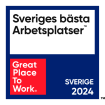We’re off! North Sweden is en-route to sustainable transportation
For the first time ever, Norrbotten was represented when national private and public sector representatives within the heavy transport and logistics sector gathered last week for the CLOSER annual innovation summit. Since January 2023, LTU Business is the regional host organization of CLOSER in northernmost Sweden and will drive collaborative projects to transform the transport sector for better efficiency.
So what does stakeholders need to know? We asked team North – Karin Sandlund and Erik Hagenrud.
Why does this matter?
– Efficient and sustainable transport for goods and people are critical for society and reaching UN’s sustainability development goals. This requires cooperation between industry, logistics companies, authorities and many others: System innovation from north to south. Last week we met key stakeholders who have share goals and challenges with Norrbotten – our aim is to partner up with them to drive innovation at a large scale, says Karin Sandlund, project manager LTU Business.
What does transport efficiency really mean?
Imagine two scales, in one of them is the benefit of transport and in the other the cost of transport. Transport efficiency is about calculating not only on economic benefit and cost, but also taking into account societal and environmental perspectives such as wear and tear on infrastructure, emissions, noise, congestion, explains Erik.
A regional nod – part of the green industrial transformation of the north
– With LTU Business as our partners, we have found a fantastic opportunity to create a regional presence in northern Sweden and collaborate competent colleagues who have a great understanding of the mining and metal ecosystem. We have momentum to contribute to a fossil-free and efficient transportation supply to the industry that will soon deliver fossil-free steel to its customers, says Kristoffer Skjutare, programme director CLOSER.
Saving 11 years of innovation work
– By connecting northern Sweden to the national innovation platform on the logistics challenges, we use resources smarter, and we utilize the system and knowledge already established and developed since 2011 when CLOSER was started. Since much of Sweden’s export takes place from the north, the relationship between our region and national transport systems is evident, Karin continues.
What is the next step?
– Much innovation work is already underway directly in companies and academia. Our role will be to coordinate and find the common challenges that can be accelerated, and to ensure that northern Sweden takes part in and utilizes all the projects and initiatives that CLOSER runs in the national arena. Initially, the focus will be on the transport and logistics needs of the metal and mineral value chains, as they account for a large part of the impact of transport. We hope to launch the first innovation projects by the summer, concludes Erik.


